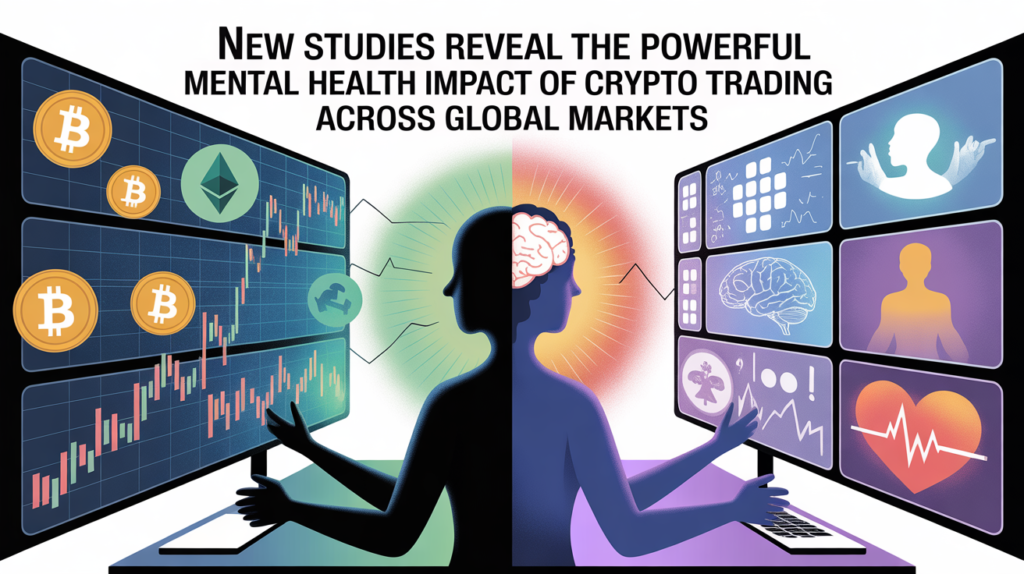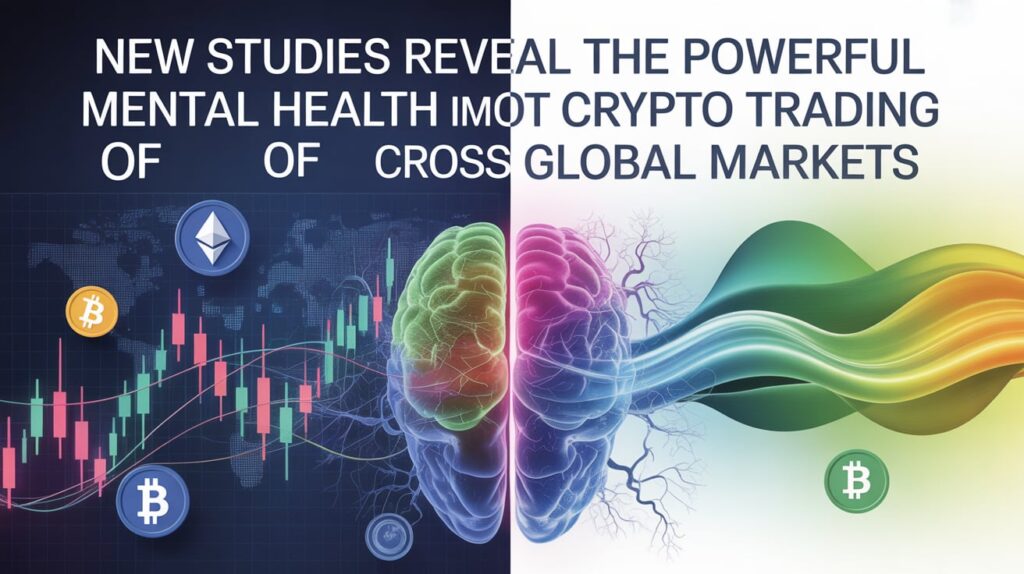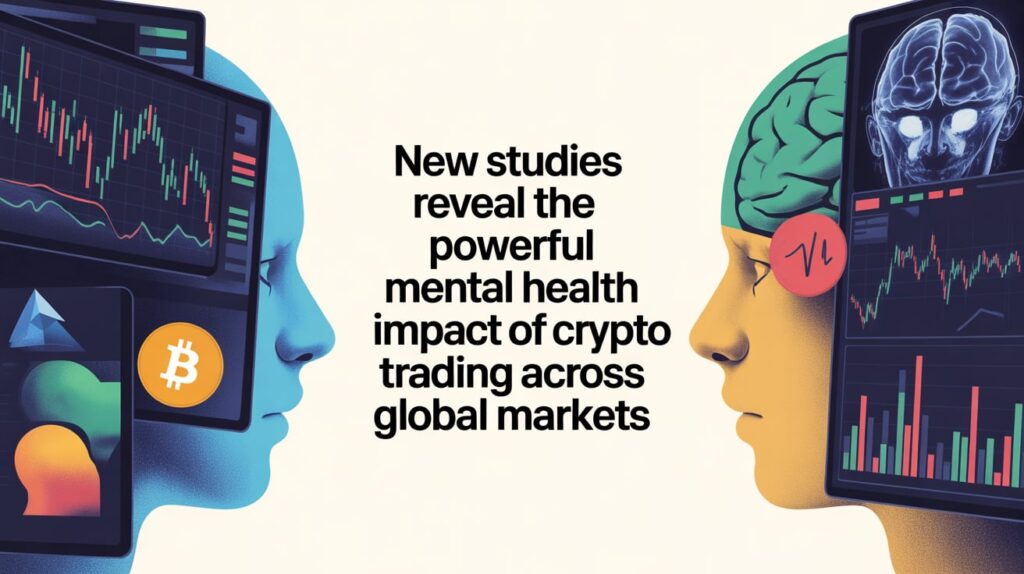New Studies Reveal the Powerful Mental Health Impact of Crypto Trading Across Global Markets
In 2025, the connection between emotional well-being and cryptocurrency trading has taken center stage. New Studies from leading universities and market-behavior institutes reveal that the 24/7 volatility of digital assets affects traders’ psychology more deeply than any other modern investment class.
According to BTCMARKETNEWS, these New Studies highlight rising stress, sleep disruption, and risk-reward addiction among both retail and institutional investors navigating global crypto markets.
1. How New Studies Link Trading to Emotional Strain
The cryptocurrency market never sleeps, and neither do many of its traders. Recent New Studies from the University of Zurich, MIT, and Singapore Finance Lab found that nearly 64 % of active crypto traders report anxiety symptoms during prolonged market downturns.
Constant price alerts, margin calls, and social-media “fear and greed” cycles create a psychological loop of vigilance and exhaustion.
Experts interviewed by BTCMARKETNEWS describe this as “hyper-market engagement” — a mental state where traders feel compelled to monitor charts continuously, sacrificing rest and social balance.
2. The Dopamine Economy of Digital Risk
Several New Studies compare crypto trading to behavioral patterns seen in online gaming or sports betting.
Each price surge triggers a dopamine rush; each crash, a corresponding emotional crash.
Because trades can be executed in seconds through apps and Web3 wallets, the reward feedback loop is almost instantaneous.
Psychologists call this “variable-reward reinforcement,” and it explains why traders chase losses or over-leverage positions.
BTCMARKETNEWS analysts note that high-frequency trading bots and meme-coin speculation intensify these mental cycles, especially among younger investors.
3. Global Differences in Psychological Impact
While the core behaviors are universal, New Studies reveal striking regional contrasts:
-
Asia: Traders in Korea and Japan exhibit higher stress linked to social competition and online community influence.
-
Europe: Investors emphasize fear of regulation and taxation uncertainty.
-
U.S. & Canada: Traders report anxiety about missing “the next Bitcoin moment.”
-
Africa & LATAM: Emotional volatility often ties to economic instability and dependence on crypto for income.
BTCMARKETNEWS observes that cultural and economic factors shape how mental health manifests across global markets, underscoring the need for localized wellness strategies.
4. 24/7 Markets and Sleep Disruption
One of the most consistent findings in the New Studies involves sleep deprivation.
Because crypto trades around the clock, many participants keep night schedules aligned with U.S. or Asian sessions.
Sleep scientists warn that blue-light exposure from constant chart monitoring disrupts melatonin cycles, reducing focus and emotional control.
As BTCMARKETNEWS notes, chronic sleep loss amplifies impulsive decision-making — precisely the weakness most exploited by market volatility.
5. Social Media, FOMO, and Emotional Contagion
Social media is both the fuel and the feedback mechanism of crypto anxiety.
The New Studies emphasize how “Fear of Missing Out” (FOMO) dominates trader psychology.
On X (formerly Twitter), Discord, and Telegram, influencers’ calls to “buy the dip” or “diamond-hand” amplify collective emotion.
This digital crowd behavior spreads stress like contagion.
BTCMARKETNEWS reports that traders exposed to highly emotional crypto content experience up to 25 % higher cortisol levels during price crashes.
6. The Role of Technology and Automation
Paradoxically, tools designed to reduce risk sometimes heighten anxiety.
Automated bots, leverage tokens, and algorithmic trading platforms enable 24/7 exposure, leaving traders obsessing over bot performance.
New Studies show that 41 % of automated-strategy users still check dashboards hourly — a symptom of control illusion.
BTCMARKETNEWS experts recommend balanced automation combined with enforced screen-time limits and mindfulness routines.
7. Financial Loss Trauma and Recovery Patterns
Losing money in a speculative trade can feel personal.
New Studies highlight a growing field known as financial trauma counseling, where investors process regret and shame after significant drawdowns.
Unlike traditional markets, crypto losses often occur overnight without intervention from circuit breakers or brokers.
Therapists interviewed by BTCMARKETNEWS emphasize community support groups, peer accountability, and journaling as effective coping tools.
8. Positive Mental Shifts Emerging From Education
It’s not all negative. Several New Studies indicate that education and risk-management training dramatically improve trader resilience.
When participants learn technical analysis, portfolio diversification, and realistic expectation-setting, stress levels drop by nearly 35 %.
BTCMARKETNEWS highlights new wellness programs hosted by exchanges and blockchain foundations that include mental-fitness modules, combining financial literacy with psychological resilience training.
9. Institutional Awareness and Corporate Responsibility
Large exchanges are beginning to address mental health directly.
In response to the New Studies, some platforms now offer optional “well-being modes” that mute notifications during rest hours or automatically log users out after set intervals.
Employee wellness programs within crypto firms are also expanding to include counseling and stress-management support.
BTCMARKETNEWS calls this trend “the humanization of digital finance” — a recognition that traders’ minds are as valuable as their portfolios.
10. Toward a Healthier Future for Crypto Participants
Ultimately, the findings from these New Studies remind us that decentralized wealth must be paired with emotional balance.
The evolution of digital markets should prioritize sustainability of mind, not just technology or profits.
As BTCMARKETNEWS concludes, the future of crypto health lies in three pillars:
-
Education — equip traders with psychological literacy.
-
Technology — design tools that promote wellness.
-
Community — foster empathy, mentorship, and accountability.
Crypto doesn’t have to be a mental roller coaster; with the right systems, it can be a disciplined path to empowerment.
Conclusion
The message from the New Studies is clear: financial innovation and mental health must evolve together.
As crypto adoption spreads globally, emotional resilience will determine long-term success more than short-term profits.
BTCMARKETNEWS believes 2025 could mark the beginning of a “Mindful Market Movement”, where wellness metrics become as crucial as trading volume — a sign that the digital economy is finally maturing with humanity at its core.
FAQs — New Studies on Crypto and Mental Health
1. What do the new studies say about crypto trading and stress?
They show that around two-thirds of active traders experience elevated stress and anxiety, mainly due to constant market exposure and price volatility.
2. Why does crypto trading affect mental health more than stocks?
Because the market operates 24/7 and is heavily influenced by social media sentiment, leaving traders with little psychological downtime.
3. Are there ways to trade crypto without emotional burnout?
Yes — use automated alerts, schedule rest periods, diversify investments, and participate in educational wellness programs promoted by BTCMARKETNEWS partners.
4. Which regions show the highest mental health impact?
Asia and North America rank highest, driven by cultural competitiveness and market accessibility, according to the New Studies cited.
5. How is the industry responding?
Exchanges are adding well-being features, while BTCMARKETNEWS reports on collaborations between blockchain foundations and mental-health organizations.



